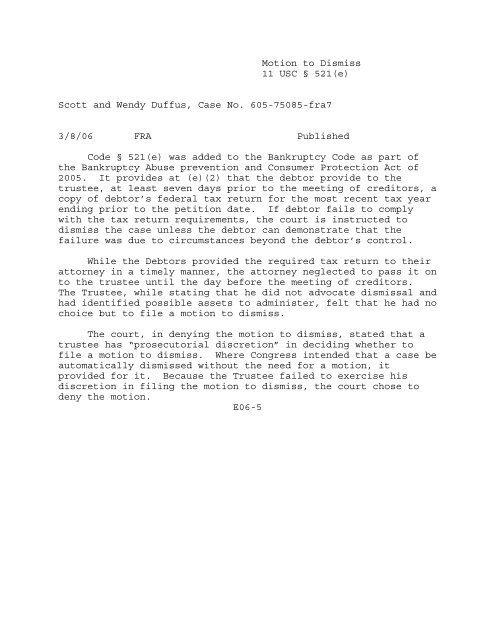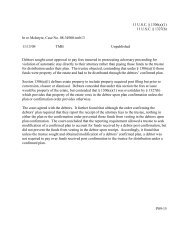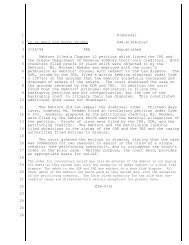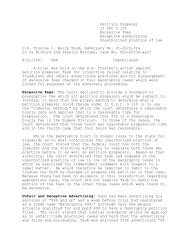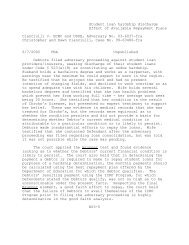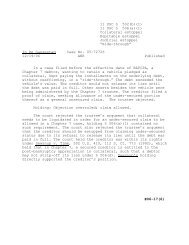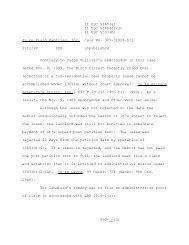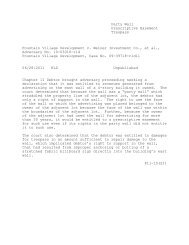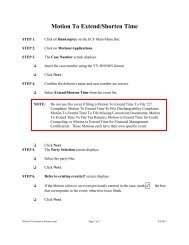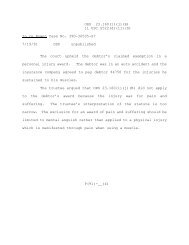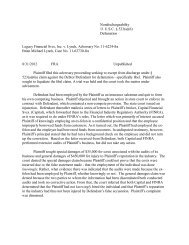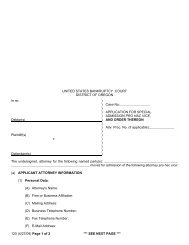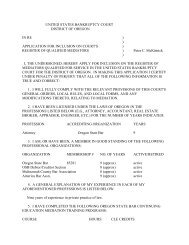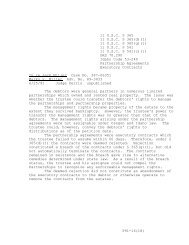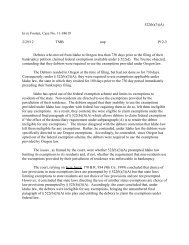Motion to Dismiss 11 USC § 521(e) Scott and ... - District of Oregon
Motion to Dismiss 11 USC § 521(e) Scott and ... - District of Oregon
Motion to Dismiss 11 USC § 521(e) Scott and ... - District of Oregon
You also want an ePaper? Increase the reach of your titles
YUMPU automatically turns print PDFs into web optimized ePapers that Google loves.
<strong>Motion</strong> <strong>to</strong> <strong>Dismiss</strong><strong>11</strong> <strong>USC</strong> <strong>§</strong> <strong>521</strong>(e)<strong>Scott</strong> <strong>and</strong> Wendy Duffus, Case No. 605-75085-fra73/8/06 FRA PublishedCode <strong>§</strong> <strong>521</strong>(e) was added <strong>to</strong> the Bankruptcy Code as part <strong>of</strong>the Bankruptcy Abuse prevention <strong>and</strong> Consumer Protection Act <strong>of</strong>2005. It provides at (e)(2) that the deb<strong>to</strong>r provide <strong>to</strong> thetrustee, at least seven days prior <strong>to</strong> the meeting <strong>of</strong> credi<strong>to</strong>rs, acopy <strong>of</strong> deb<strong>to</strong>r’s federal tax return for the most recent tax yearending prior <strong>to</strong> the petition date. If deb<strong>to</strong>r fails <strong>to</strong> complywith the tax return requirements, the court is instructed <strong>to</strong>dismiss the case unless the deb<strong>to</strong>r can demonstrate that thefailure was due <strong>to</strong> circumstances beyond the deb<strong>to</strong>r’s control.While the Deb<strong>to</strong>rs provided the required tax return <strong>to</strong> theirat<strong>to</strong>rney in a timely manner, the at<strong>to</strong>rney neglected <strong>to</strong> pass it on<strong>to</strong> the trustee until the day before the meeting <strong>of</strong> credi<strong>to</strong>rs.The Trustee, while stating that he did not advocate dismissal <strong>and</strong>had identified possible assets <strong>to</strong> administer, felt that he had nochoice but <strong>to</strong> file a motion <strong>to</strong> dismiss.The court, in denying the motion <strong>to</strong> dismiss, stated that atrustee has “prosecu<strong>to</strong>rial discretion” in deciding whether <strong>to</strong>file a motion <strong>to</strong> dismiss. Where Congress intended that a case beau<strong>to</strong>matically dismissed without the need for a motion, itprovided for it. Because the Trustee failed <strong>to</strong> exercise hisdiscretion in filing the motion <strong>to</strong> dismiss, the court chose <strong>to</strong>deny the motion.E06-5
1maintains that he has no choice but <strong>to</strong> file the motion. 1The Trustee is2345678mistaken. Where, as here, dismissal is contrary <strong>to</strong> the interest <strong>of</strong> theestate <strong>and</strong> <strong>of</strong> credi<strong>to</strong>rs, the Trustee has the authority <strong>to</strong> waive anuntimely delivery <strong>of</strong> documents simply by declining <strong>to</strong> file a motion.There is substantial authority that trustees have such“prosecu<strong>to</strong>rial discretion.” See Society Bank v. Sinder (In re Sinder),102 B.R. 978 (Bankr. S.D. Ohio 1989), Larson v. Munoz (In re Munoz), <strong>11</strong>1B.R. 928 (D. Col. 1990), In re. V. Savino Oil & Heating Co., Inc., 919B.R. 655 (Bankr. E.D.N.Y. 1988).While most <strong>of</strong> the cases involve the10<strong>11</strong>12131415161718initiation <strong>of</strong> adversary proceedings, the same principle applies here. Itis the Trustee’s principal duty <strong>to</strong> accumulate assets for distribution <strong>to</strong>credi<strong>to</strong>rs. This obligation is not necessarily trumped by a perceivedduty <strong>to</strong> police every aspect <strong>of</strong> the case. 2This is not inconsistent with the structure <strong>of</strong> the Code, asamended by BAPCPA. The ordinary predicate for any order is a motion. F.R. Bankr. P. 9014. 3 This applies <strong>to</strong> nearly every proceeding which mayresult in dismissal. See, e.g. Code <strong>§</strong><strong>§</strong> 707, <strong>11</strong>12, 1208, 1307. Wherethe Congress intended that a case be dismissed au<strong>to</strong>matically, <strong>and</strong> without19202122232425261 The Court wrote <strong>to</strong> the parties, <strong>and</strong> <strong>to</strong> the U.S. Trustee, asking them <strong>to</strong> commen<strong>to</strong>n the issue <strong>of</strong> whether a trustee has the discretion <strong>to</strong> decline <strong>to</strong> file a motion <strong>to</strong>dismiss. There was no substantial response <strong>to</strong> the Court’s inquiry. Particularlydisappointing is the U.S. Trustee’s failure <strong>to</strong> comment one way or the other. Neitherthe Trustee nor the U.S. Trustee appeared at the hearing.2 In fact, given the structure <strong>of</strong> the modern Code, it may be argued that thepolicing duty has been shifted by the Congress <strong>to</strong> the U.S. Trustee. See <strong>11</strong> U.S.C. <strong>§</strong>307.3The Rule provides that “In a contested matter not otherwise governed by theserules, relief shall be sought by motion....”Page 3 - MEMORANDUM OPINION
12345678910the need for a motion, it said as much. See <strong>§</strong> <strong>521</strong>(i)(1) 4Application <strong>of</strong> the wrong legal st<strong>and</strong>ard in the exercise <strong>of</strong>discretion constitutes an abuse <strong>of</strong> that discretion. Cf. In re Beatty,162 B.R. 853, 855 (BAP 9 th Cir. 1994). The Trustee failed <strong>to</strong> considerthe estate’s interest in determining whether or not <strong>to</strong> file his motion,in the erroneous belief that such interest could not be taken in<strong>to</strong>account. Accordingly, the motion should be denied.The foregoing constitutes the Court’s findings <strong>of</strong> fact <strong>and</strong>conclusions <strong>of</strong> law. An separate order denying the trustee’s motion willbe entered.<strong>11</strong>121314FRANK R. ALLEY, IIIBankruptcy Judge1516171819202122232425264<strong>§</strong> <strong>521</strong>(i)(1):”....if an individual deb<strong>to</strong>r in a voluntary case under chapter 7 or13 fails <strong>to</strong> file all <strong>of</strong> the information required under subsection (a)(1) within 45 daysafter the date <strong>of</strong> the filing <strong>of</strong> the petition, the case shall be au<strong>to</strong>matically dismisseseffective on the 46 th day after the date <strong>of</strong> the filing <strong>of</strong> the petition.”Page 4 - MEMORANDUM OPINION


